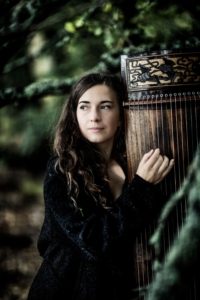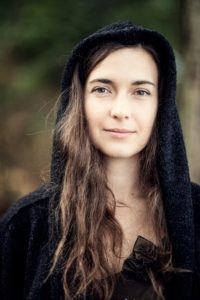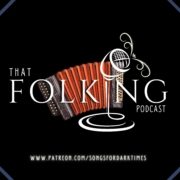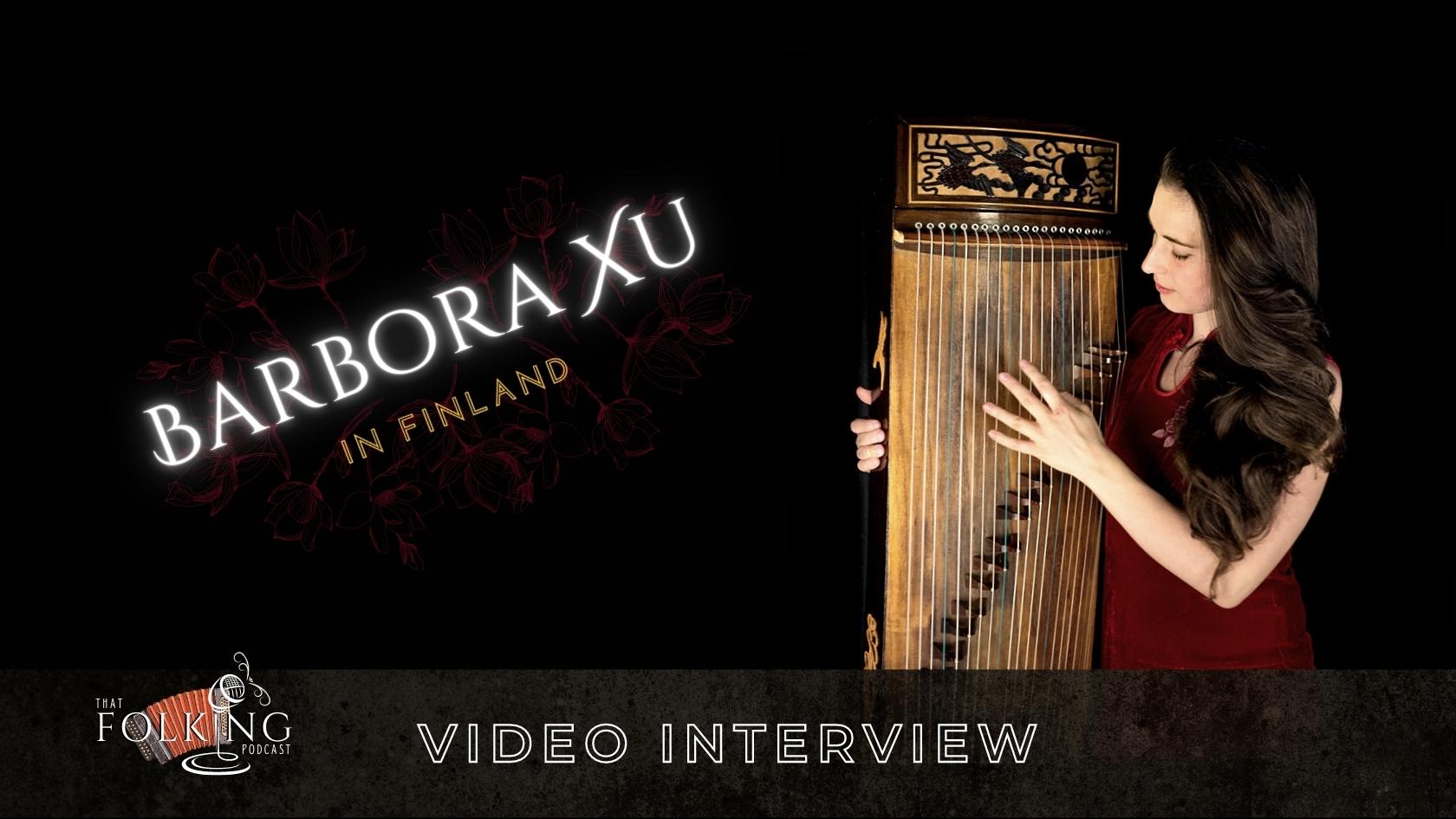Olin Ennen (I Was)
An intimate interview with Czech folk musician, Barbora Xu, in Finland.
 What do Finland, China & the Czech Republic all have in common? It may sound like the beginning of a joke, but the answer is talented Czech folk musician, Barbora Šilhanova (Barbora ‘Xu’), who launched her debut album, Olin Ennen (in Finnish, ‘I Was’) this October. Drawing upon ancient Finnish & Chinese poetry, the album focuses on the juxtaposition and mirrored parallels of these two fascinating regions. Xu’s lyrics are filled with lush imagery of water, birds, trees and the delicate interplay between light and darkness; between loss and creation. Set to both original and traditional melodies, Xu deftly weaves together the unmistakable sounds of Finnish kantele and Chinese guzheng with her feather-light, yet powerful vocals. With ethereal subtlety and nuanced simplicity, Xu manages to seamlessly intertwine East & West as if they were complimentary cousins, not vastly different cultures that exist half a world apart. In short, this album is an homage to our symbiotic relationship with nature and with one another. My discovery of Barbora and her entrancing music goes beyond just good folk music, however. It was born from sheer luck and a series of fortunate mishaps…I am now, oh so glad they mis-happened.
What do Finland, China & the Czech Republic all have in common? It may sound like the beginning of a joke, but the answer is talented Czech folk musician, Barbora Šilhanova (Barbora ‘Xu’), who launched her debut album, Olin Ennen (in Finnish, ‘I Was’) this October. Drawing upon ancient Finnish & Chinese poetry, the album focuses on the juxtaposition and mirrored parallels of these two fascinating regions. Xu’s lyrics are filled with lush imagery of water, birds, trees and the delicate interplay between light and darkness; between loss and creation. Set to both original and traditional melodies, Xu deftly weaves together the unmistakable sounds of Finnish kantele and Chinese guzheng with her feather-light, yet powerful vocals. With ethereal subtlety and nuanced simplicity, Xu manages to seamlessly intertwine East & West as if they were complimentary cousins, not vastly different cultures that exist half a world apart. In short, this album is an homage to our symbiotic relationship with nature and with one another. My discovery of Barbora and her entrancing music goes beyond just good folk music, however. It was born from sheer luck and a series of fortunate mishaps…I am now, oh so glad they mis-happened.
In 2016, I found myself on a plane to Ireland. I had begun my travels through Europe some months prior, with the notion of testing the waters as a would-be vagabond and self-made ethnochoreologist (a massive word, for those that don’t know, which simply means I really, really like folk dancing). My aim was simple. I would learn as many traditional dances & songs as I could, from as many countries as I could, in the span of a few short months. If all went well? Why, then I would return to the states to earn as much money as possible, as quickly as possible. Then I would return to Europe, devoting every waking moment of the rest of my life to folk music and dance, until they kicked me out.
However, nothing had gone according to plan. By the end of the first month, I had hurt my ankle and gotten terribly, terribly sick. Twice. Friends and rooms and trains and events had constantly (almost comically) been canceled or needed to be re-booked. By the end of the second month, I was sore, tired and felt like I had learned almost nothing. In short, aside from a few spare instances, I was absolutely miserable. When I also realized I was down to my last $300, with three weeks left until my flight home and yet another volunteer gig falling through, I decided to do something reckless.
Now, traditional Irish music has been the love of my life since I encountered my first slip jig on an old mixtape, at the tender age of 11. From then on, I was filled with desperate yearnings to explore Ireland’s rain-soaked hills, its dark oceans, pubs drenched with the scents of salt, fish and sour Guinness, and the emerald green of it’s ancient countryside. Yet, strangely, Ireland had never made it onto my itinerary. So, that night, with no idea where I would stay or what I would do once I got there, I spent a third of what money I had left and boarded a last-minute flight to Cork, which would land just after midnight. I would sleep on the airport floor, if I had to, but I was going to see Ireland, at last! On the plane, I was seated next to a quiet, grey-haired gentleman and his wife. Fifteen minutes into the flight, he unexpectedly leans over, startling me, and in an excited whisper he says,
“Saw yer guitar! Are yeh goin’ to the Fleadh, then?!”
“I’m sorry…I don’t…uhhh…” I said. “What’s a…flaw?”
“The Fleadh! The Fleadh Cheoil?!” he says, as though I’d stepped off of some alien planet. “Ya don’t know the Fleadh? It’s Ireland’s week-long dance and music festival! Why, it’s massive! Only happens once a year! Just started, yesterday. I just figured you’d be playin’ there, seein’ as yer a musician. Why, but ya must go. Sure, it’s grand.”
I won’t get into the full story of how I got there, nor all the other magical and crazy (and potentially dangerous) things that happened in Ireland. Suffice to say that my luck, seemingly, had changed. Or, maybe I had just grown braver, so fate was lending a hand. Whatever the reason, after a few awkward conversations with strangers, and huge kindnesses, I wound up with a couple of dear, new friends in Cork, who put me on a bus headed for Ennis, where the Fleadh Cheoil was being held that year. Though I’d only just picked up guitar and had barely gotten up the courage to play or sing in public, I found myself wandering through Ireland’s biggest folk music and dance festival, tagging along with a small group of great musicians. One of these was Barbora Xu.
 I cannot tell you exactly how Barbora became part of our little group, nor when. What I do remember is that, at some point thereafter, I found myself standing in what felt like a sea of people, when this coquettish, dark haired woman with a winning smile made a beeline for me. Apparently, I had been humming something under my breath and she had heard it.
I cannot tell you exactly how Barbora became part of our little group, nor when. What I do remember is that, at some point thereafter, I found myself standing in what felt like a sea of people, when this coquettish, dark haired woman with a winning smile made a beeline for me. Apparently, I had been humming something under my breath and she had heard it.
“Oh-ho!” She said. “You can sing. Ok. Come with me.”
She grabbed my hand and lead me away from the group, trying to find a corner or alley with reasonable acoustics and fewer people. We found one and, without preamble, she begins to sing, looking at me expectantly. I follow suit. We start improvising together and laughing, getting to know one another with our voices. She teaches me a haunting, Moravian love song. I teach her my favorite old English round. Over the next few weeks, we share stories and recordings. We part ways for a week and meet up again, this time in Killarney. We discuss music and philosophy. We speak of loves lost and found, the unfathomable pull one feels when walking in the woods or standing by the sea, and the many complexities that drew us to Ireland. In short, we become fast friends.
Now, in the almost half-decade since then, in which I spent most of my time hitchhiking around Europe or performing across the US and Canada, (spoiler alert; I missed two flights home and never completely returned to my ‘normal’ life again), I have come to realize that what I have really been searching for is the answer to one deep, burning question. Why do we make music? What is the thing that incites babies and children to sing and dance, before they know how to speak? Why is it that every culture in the world is moved to create some kind of music? What is it, time and again, that has driven people in the most dire of situations to create art when hope, food, shelter, and loved ones have been lost or taken from them?
In some ways, the folk podcast I have been hosting is a means of attempting to seek (or offer) abstract answers to this question, though I do not think that a simple answer could ever do the question justice. Certainly, we can examine the principles of resonance, discuss music theory or the mathematics within music for an answer. We could look to biology and learned behaviors or our prehistoric need for communication. But I think we would only be touching on a fractal image of an answer; a simplistic and sterile shard or reflection of the truth. Perhaps the answer needs to be uncovered slowly, painted by suggestions that glide around the subject, capturing the shape of an answer, without solidifying. In other words, perhaps the why? can only be answered in the same way that music itself is an answer, offering a voice to the unvoicable. At least, that is what I am trying to do as I rebrand and relaunch this podcast. Through sharing the music, voices and cultural experiences of so many fantastic musicians and fascinating people I have encountered on my travels, my hope is to offer an abstract answer to the question, “Why do we make music?” Because I think we desperately need to remember.
Two things of note seem to resurface again and again in my quest for understanding. The first is that almost all of the folk musicians I interview seem to have found some deep-seated relationship to the land and the importance of a re-connection to nature. The second is that music has profound power. Whether that power, as I said, is used to give voice to our deepest emotions and longings or simply to bring people together through jokes and drinking songs, is irrelevant. Whatever the reason, folk music and movement have the ability to connect deeply, even the most unlikely people. It seems only fitting then that my first guest in this new era is none other than Barbora Xu, whose lyrics embody the liminal undercurrents and suspended moments wherein life is truly experienced, and a reminds us that we are not all that different, one from another, despite the separation of centuries and great distances. Her work may be formed from the ancient traditions she studies, but it is simultaneously entirely modern and utterly her own. Her love of jazz, her understanding for the dire need to create bridges between cultures and across generations, and her determination to conjure brightness within a world that seems to focus only on chaos—all these things, and more, can be heard in this album.
In the Finnish national epic, The Kalevala, it is said that the kantele was created by the wizard Väinämöinen. He used it’s entrancing sound and the power of singing to not only enchant, but to fight foes, shaping and reshaping the world, again and again, through song. In Olin Ennen, Xu offers us a reminder of this tale. Her album, which is already climbing Global Music charts, is a profound love letter to the natural world she so deeply treasures, and to our ability to transform. It is a calling back to the wilds, where we might remember the epic power of song to heal, reshape, and grow again.
Barbora Xu currently lives in Finland, on one of it’s many gorgeous archipelagos, with her partner and their newborn son. When not performing or working on any number of projects, she can be found studying at the world-renown Sibelius Academy, working toward her second Bachelors and Masters degrees, this time in Global Music. Olin Ennen can be heard on all music streaming platforms, courtesy of Nordic Notes. You can watch the album release concert here and support the artist by purchasing her work through her website.
As a reader of FolkWorks, you are invited to view the exclusive video interview, here. The official Folking episode, which includes music, will premier on iTunes, Stitcher and Spotify on November 30th, 2021. If you would like early access to the podcast, feel inclined to explore my other projects, or wish to support my work, head over to Patreon.
Olin Ennen (I Was)
An intimate interview with Czech folk musician, Barbora Xu, in Finland.














